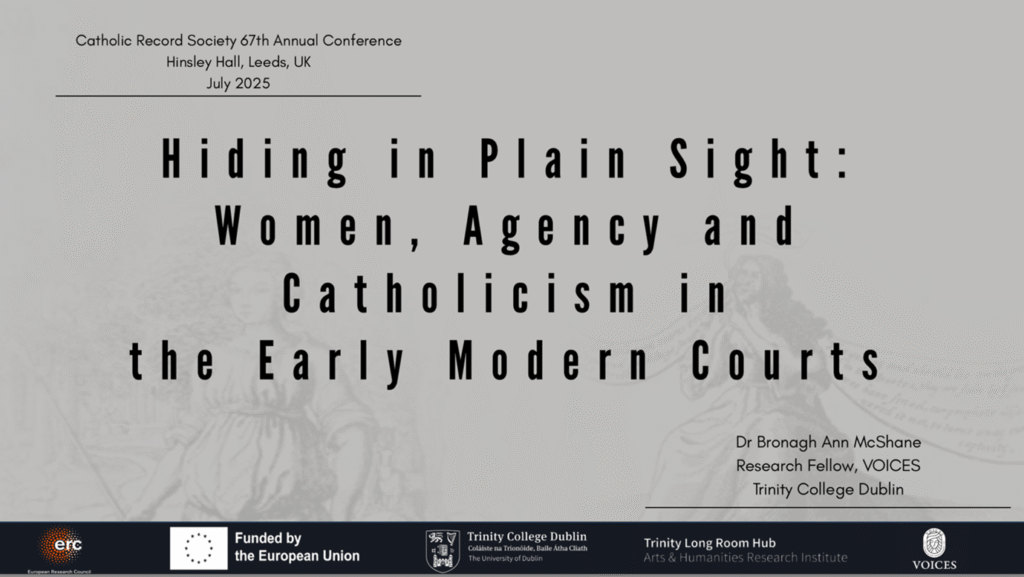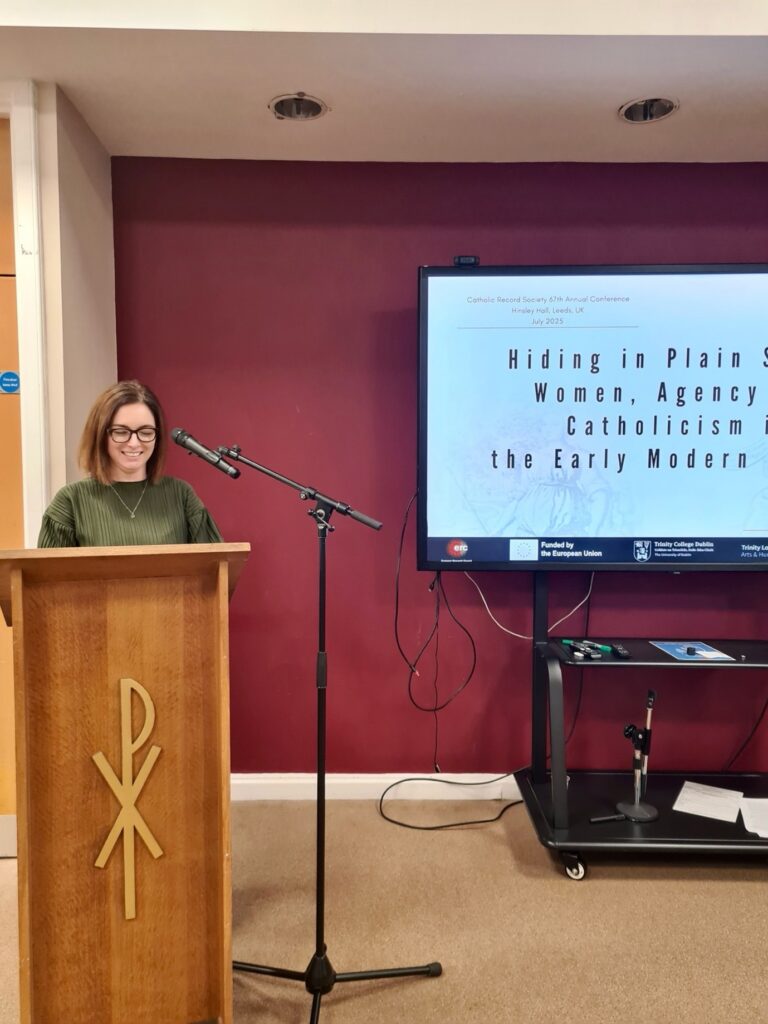Keynote Lecture at the Catholic Record Society Hiding in Plain Sight: Women, Agency, and Catholicism in Early Modern Ireland
By Dr Bronagh Ann McShane
In July 2025, I had the pleasure of delivering the opening keynote lecture at the annual Catholic Record Society Conference, held at Hinsley Hall in Leeds. My paper, ‘Hiding in Plain Sight: Women, Agency and Catholicism in the Early Modern Courts’, drew on research from the VOICES Project (Life and Death, War and Peace, c.1550–c.1700: Voices of Women in Early Modern Ireland), an ERC Advanced Grant-funded project led by Professor Jane Ohlmeyer at Trinity College Dublin.
The lecture explored how Catholic women in seventeenth- and early eighteenth-century Ireland navigated the Protestant legal system to sustain faith, kinship, and community life in an age of repression. I argued that rather than being silenced by the Penal Laws, women often used the law itself to articulate belief and preserve family continuity. Their words, recorded in wills and probate records, survive within the very institutions that were intended to erase them.

I opened with the will of Margaret Merroney, a Catholic widow from County Clare who wrote her testament in 1703, the same year that Parliament passed the Act to Prevent the Further Growth of Popery. Despite its overtly Catholic provisions, her will was proved in the Protestant-run Prerogative Court of Armagh. It stands as a striking example of how Catholic practice could be embedded within, rather than excluded from, the structures of the Protestant state. In this case, Catholicism in early modern Ireland was, quite literally, hiding in plain sight.
From that starting point, the keynote considered a broader set of questions. What does it mean to speak of women’s agency in a legal world designed to suppress it? How might historians recover voices that appear not at the margins but at the very centre of official records? And how do we read documents produced under constraint without mistaking compliance for silence?

The lecture situated these questions within the evolving historiography of the Penal Laws. Traditional nationalist narratives portrayed the period as one of uniform Catholic oppression. More recent scholarship, however, reveals a far more uneven and locally negotiated system of regulation. Enforcement depended on circumstance, personality, and political expediency. Within that patchwork, spaces of ambiguity opened up that women could and did exploit. Agency, in this context, rarely took the form of open resistance. It manifested instead through adaptation, quiet negotiation, and the creative use of legal mechanisms to secure religious and familial ends.
My analysis focused on testamentary records such as wills, probate files, and letters of administration as key sources for tracing this phenomenon. These documents were shaped by canon law tradition but administered by Protestant ecclesiastical courts. They are uniquely positioned to illuminate how Catholic women interacted with official structures of power. Wills were simultaneously legal and devotional texts, blending the language of property and obligation with the rituals of faith and remembrance.
Recovering these records is no simple task. Ireland’s testamentary archive suffered devastating losses with the destruction of the Public Record Office in 1922. What survives today is fragmentary and dispersed, consisting of scattered copies, printed abstracts, and family transcripts preserved by chance. Through the VOICES Project, we are working to reconnect and digitise these remnants, assembling a corpus that restores visibility to the women who appear within it.
Taken together, the surviving wills reveal patterns of resilience and continuity that challenge received views of Catholic women’s passivity under Protestant rule. They show women making strategic choices, directing funds, naming executors, managing inheritance, and ensuring that religious obligations were met even when law and custom sought to deny them full agency. Through these acts, women transformed the apparatus of the state into a vehicle for spiritual and familial endurance.
In concluding the keynote, I reflected on the methodological and ethical challenges of reading such sources. The archival record, I suggested, is not a neutral repository but a product of power, silence, and strategy. Yet within its silences we can discern acts of legal and devotional creativity that speak to women’s persistence across generations.
The lecture was warmly received by scholars of religious, legal, and women’s history from across Britain and Ireland. Discussion centred on how re-examining ecclesiastical court records can shed new light on the lived experience of Catholic communities and on the potential of digital recovery projects like VOICES to transform the landscape of early modern Irish history.
By bringing these scattered fragments together, the VOICES Project seeks not only to recover women’s voices but also to rethink how archives themselves bear witness to endurance, negotiation, and faith, quietly but unmistakably hiding in plain sight.
My sincere thanks to the Catholic Record Society for the kind invitation to speak at the conference and for the warm hospitality and generous reception extended to me throughout my visit.